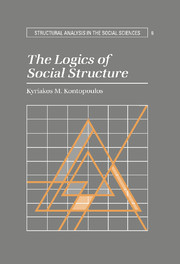Book contents
- Frontmatter
- Contents
- Preface
- Introduction
- Part I Metatheoretical considerations
- 1 Epistemic strategies in contemporary science
- 2 The dynamics of emergence: the case against reductionism
- 3 The nature of hierarchical and heterarchical organization
- 4 Some formal theses on hierarchy and heterarchy
- Part II Compositionist logics
- Part III Logics of hierarchy
- Part IV Heteracrchical logics
- Part V The phenomenology of social structures
- Appendix: The logics of structuration
- Glossary
- Bibliography
- Index
1 - Epistemic strategies in contemporary science
Published online by Cambridge University Press: 24 October 2009
- Frontmatter
- Contents
- Preface
- Introduction
- Part I Metatheoretical considerations
- 1 Epistemic strategies in contemporary science
- 2 The dynamics of emergence: the case against reductionism
- 3 The nature of hierarchical and heterarchical organization
- 4 Some formal theses on hierarchy and heterarchy
- Part II Compositionist logics
- Part III Logics of hierarchy
- Part IV Heteracrchical logics
- Part V The phenomenology of social structures
- Appendix: The logics of structuration
- Glossary
- Bibliography
- Index
Summary
One of the most puzzling issues among modern scientists and philosophers has been that of whether or not, for virtually all the domains of nature, higher levels of organization are determined – and therefore also explained – by lower levels of organization. Two obvious answers are available to this question informing two antithetical positions on the matter: (1) an epistemic belief in elementarism or microdeterminism holding that lower-level parts determine and explain the composition and behavior of higher-level wholes; or (2) an epistemic belief in holism and/or macrodeterminism, which asserts that higher level wholes are something distinct from the parts they incorporate and are, therefore, independent of them. Elementarism and holism, irreconcilable opponents, have been with us from the outset of philosophical inquiry. We saw them clash most recently when, in the 1930s and 1940s, the advancing armies of logical positivists and their allies attempted to enthrone elementarism, that is, behaviorism, physicalism, and methodological individualism, in the empires of science and philosophy. Today, in the postpositivist era, we still find ourselves entangled in and puzzled by the old dilemma – but now, at least, several new alternatives are open to us.
Epistemic strategies
Were one to complete a survey of contemporary science and philosophy of science, including the most recent and exciting work, one would discover five basic epistemic strategies that either have been already utilized in previous research or are currently proposed as more appropriate alternatives to previously-utilized strategies.
- Type
- Chapter
- Information
- The Logics of Social Structure , pp. 11 - 24Publisher: Cambridge University PressPrint publication year: 1993



